Over the last 6.5 years, Dave and I have spent a considerable amount of time and money fixing up, renovating, remodeling, and decorating our home.
I’m certain we’ve spent far LESS than what others might have spent to do the exact same projects — thanks to the help of my Dad and our families, the fact that Dave and I put TONS of hours in ourselves, the fact that neither of us has expensive taste, and… Craigslist 🙂
But when we add it all up, we’ve still spent A LOT on this house!
That said, we purchased this house with the intention of gutting it room-by-room and completely renovating it to fit our style, our needs, and our wants. We negotiated a much lower selling price because we knew the house needed so much work — AND we were fortunate to buy it during a period when home prices were ridiculously low in our area.
Considering what we paid for the house plus the money we’ve put into the house over the years, the price would still be very reasonable for our area and I definitely feel we could still sell our home for a nice profit (even though we have ZERO intentions of selling it!)
SIDE NOTE: The previous owners (older empty-nesters) have come back to visit our house 3 times already and gushed on and on about how much they love what we’ve done with it and how happy they are to see another young family in “their” home!
Anyway, I am regularly asked how we budget for house projects, if we have separate savings accounts for different projects, and if we would ever stop in the middle of a project if it got too expensive — all good questions!
I’m sharing more about all these questions today… but I’m guessing many of you would be shocked to know that Dave and I actually DON’T budget for house projects!
Yup, you read that correctly, we don’t create a budget for our home renovations!
.
Why We DON’T Budget For House Projects:
Believe it or not, Dave and I really have never made a super specific budget for any of our house projects (even our huge kitchen renovation). We usually have a general number in mind for what we’d like to stay below. However, we learned very early on that there are SOOOOOO many unknowns when working with an old house, and there’s almost no way to accurately factor everything in until we’re already well underway with a project — at which point, there’s no turning back.
Having a super strict budget is not something I feel would work for our home renovations because it would take a huge amount of time and effort to meticulously plan for all the unexpected “what if’s” — and then we’d be stressed out the whole time, wondering if we were “going over budget”. We might even try to cut corners and buy cheaply made products or do without a feature we really wanted if we felt we were getting close to our maximum spending amount.
That’s not how we want to renovate the home we hope to live in forever!
.
How We Fund Our Home Projects WithOUT a Budget:
First of all, I should probably mention that we have never taken out a loan for any of our house projects — to us, it’s not worth getting into debt just to renovate an area of our home. So we wait until we’ve saved up more than what we feel it will take for whatever project we want to tackle, and then we get to work!
Instead of a strict budget, Dave and I decided very early on in our marriage that we would never let our savings account get lower than a certain amount — the amount we decided on “way back then” was an even $10,000. And to date, I can’t think of any time when we’ve let our savings account get lower than that.
So, for example, if we had $13,000 in our savings account, we would basically look at that as having $3,000 — which means we would never even consider tackling a huge kitchen renovation or a massive landscaping project.
That said, if we knew we had a very expensive home renovation on the horizon, we would be conscious of that fact and continue to pad our savings account as much as we could until we had much more than we thought was necessary for our home project.
.
How We Fund Our Savings Account:
It sounds so easy to say “we never let our savings account get less than $10,000”, but we need a way to continually fund our savings account if we ever want it amass more than $10,000 and have enough for house projects!
As I’ve mentioned before, Dave and I usually only do home projects from late spring through late summer (when Dave is home from school). This means, we have 9-10 months to save, save, save in between our summer renovations — we almost never touch the money in our savings account during the school year.
And since we’ve always made a point to live off 50% of our income, the other 50% goes straight into our savings account each month — making it fairly easy to save quite a good amount over the course of the school year (even though neither of us have super high-paying jobs).
We then use the money built-up in our savings account to pay down our mortgage and fund our various house projects throughout the summer.
Oh, and we do NOT have separate bank accounts for different projects — we just pull from our savings account. I definitely think that having separate savings accounts is a good idea, it’s just never something we felt the need to do.
Our non-budget system is not a perfect system, but it really has been working wonderfully for us for the past 11 years!
.
This is not our emergency fund!
One thing I want to make very clear is that the $10,000 in our savings account is NOT our emergency fund. We look at this number as basically $0 — so to us, having $10,000 in our savings account basically means we have $0 in our savings account. If we have $15,000 in our savings account, that basically means we have $5,000.
I know that might be a weird concept, but if the $10,000 were our emergency fund, we would be tempted to use it when we needed to replace our Air Conditioning unit last summer, or when we learned that our minivan needed all new brakes right before we left for vacation — and then it would quickly become less than $10,000.
In general, we try to pay for all our daily, weekly, monthly, AND smaller emergency expenses directly from our checking account. If a larger emergency comes up, we will use money in our savings account (as long as we are well above the $10,000). Otherwise, we have money markets and other investments that serve more as “emergency funds” for us.
That $10,000 would be a super-duper, VERY last resort in the event that we somehow used up all the money in our checking account, all the money above $10,000 in our savings account, and the funds in our money markets — and I really can’t think of any situation which would cause this to happen without some sort of insurance kicking in. If we were in that bad of a financial position, we would most likely choose to sell our house or one of our cars.
.
Why $10,000?
I honestly can’t even remember exactly how or why we decided on $10,000 — I believe an older couple recommended that number to us and we just went with it.
At the time, newly married and fresh out of college, that number seemed almost unreachable… but again, since we committed to living off 50% of our income and putting the other 50% into savings, it was astonishing how quickly we came up with our first $10,000, even while paying off our student loans.
I realize there might be many people who think it’s ridiculous to keep $10,000 cash in a low-interest-earning savings account (and probably others who couldn’t imagine keeping so little in a savings account) but again, I’m just sharing what works for US right now.
Different numbers might work better for different families, but based on our income and our average monthly spending, $10,000 seems like a good number for us.
It might sound crazy, but for Dave and me, simply knowing that we always have that $10,000 of easily-accessible cash as a very last resort is enough for us to feel confident and comfortable spending money on our house projects without constantly worrying about “going over budget”.
.
So that’s how we fund our house projects without a budget.
I completely understand that this non-budget approach to home renovations would NOT work for everyone — but considering Dave and I are both “savers” and not “spenders”, we don’t have expensive taste, we love finding great deals, and we’re willing to do a lot of work ourselves to save money, this non-budget method of saving for house projects works really well for us.
We never “waste” time dilly-dallying over specific numbers or worrying about how much every single piece of our project will cost.
We don’t stress about spending $50 more to get exactly what we want or splurging an extra $200 on something that’s much higher quality — and we can usually give the ‘green light’ to any little add-on projects we want to tackle along the way (like when we realized we could miraculously raise Nora’s bedroom ceiling a whopping 14″) because we know we have some wiggle room in our “non-budget” 🙂
We’ve never gone into debt over a house project, we’ve never felt like we spent too much on a project, and I honestly can’t think of any project we regret doing.
Dave and I are both careful with our spending, but we also both enjoy putting money into our home versus putting money into so many other things (fancy cars, glamorous vacations, designer clothing, expensive date nights, etc.)
What do you think…
Are we crazy?
Can you believe we don’t budget for this stuff?
How do you handle larger home expenses?

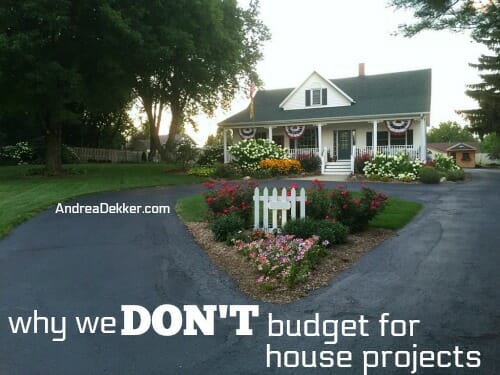
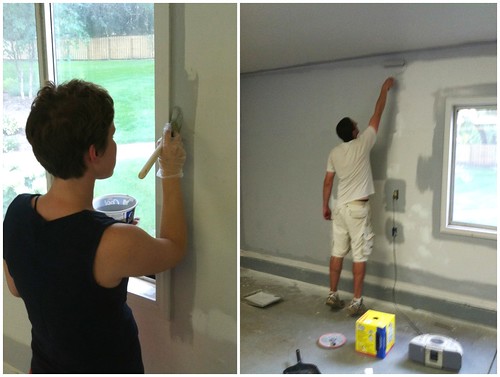
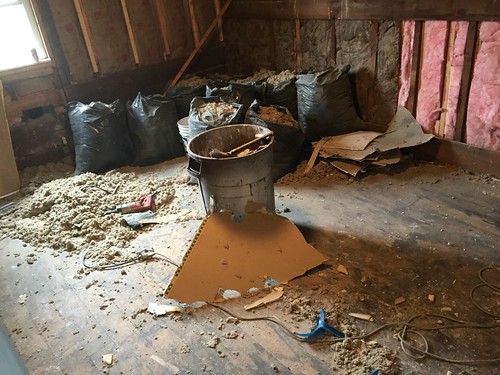
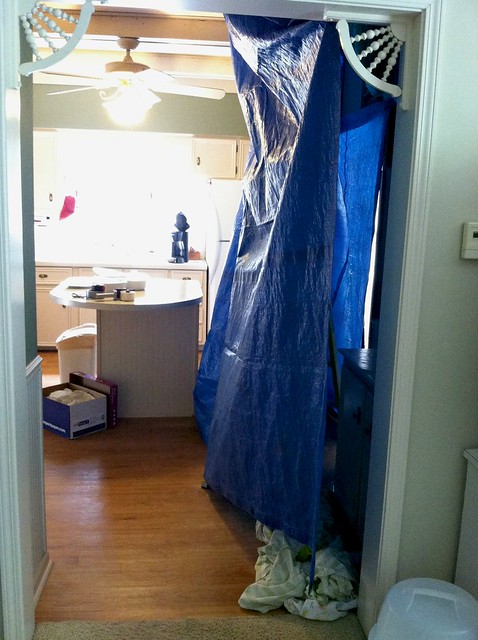
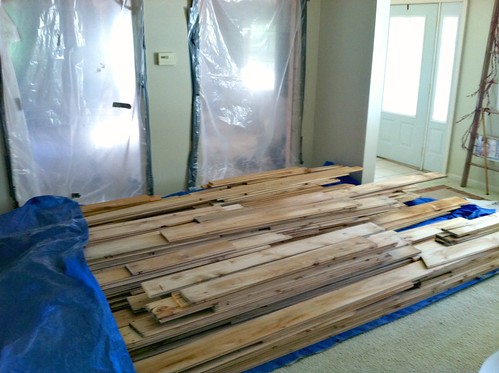
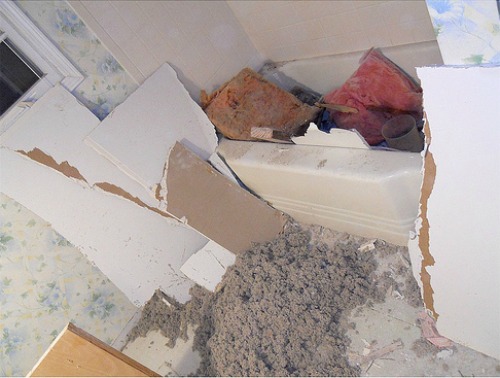

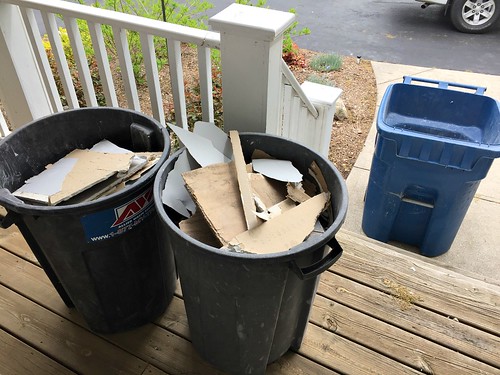
Lynn says
Just wondering … do you live off of 50% of your take-home pay after-taxes – or 50% of total income? I am so amazed that you can live off of 50% (either before or after taxes)!! That’s awesome! Truly an inspiration!
Andrea says
yes, 50% of the take-home pay. We basically have always lived off Dave’s take-home pay (a Christian school teacher salary!), and then any money I make goes into investments, savings, to pay down our mortgage, for bigger purchases like a new van, and for house projects.
PW says
Very interesting. We did massive renovations to our 50 yr old home but we had a renovation bank account, and as we saved for a project we got the job done. In the Chicago area you have to have most remodels designs given to the community engineers who have to inspect, each person you use has to be licensed with the community and provide their certificates of insurance and provide their plumbing licenses etc. Then you have to get permits to put in the window and they inspect every 2 weeks, then final inspection. That means you have an engineering inspection, an electrical inspection, a plumbing inspection. Those alone cost about $4000 before you begin the project to the end. If you sneak and try to do it the communities have cars that drive around to “spy” and if they see any company trucks, dumpsters, saws on driveways etc. they fine you. So much fun. Hard to use a family member or do it yourself. And because we both work long hours we did what we could ourselves b4 work, after work and on the weekends. Our renovations always went over budget due it being an older home and because the inspectors would come in and demand more work. A nasty Chicago game. Ours were never like yours due to where we live. Bless you for living in Michigan. In our area the dollar amount of the renovation is added to the price of the house which increases drastically the real estate taxes. It’s a political game. One Fall we were having our annual furnace inspection, cleaning and the village came in to see if we were installing a new furnace without a permit etc. shockingly sad,
Becky says
What a racket!
Andrea says
wow! We have to get permits too — but they aren’t nearly that expensive. Some are less than $50!
Sarah Parsons says
Hmm…I’d argue that you DO budget, you just “budget” a very rough lump sum, and don’t specify an exact amount, or break it down.
Like you said, you make sure you have enough in savings to cover as much or more than you think the total project will cost, and make sure you don’t go over that – I’d call that a budget. 🙂
Trisha G says
Agreed!
My question is how do you determine how much you will need for each project? Like your kitchen vs Nora’s bedroom reno you did this year? Did you do her project first and then see what was leftover and put that towards your mortgage? Or do you have a set amount you put towards your mortgage and then do the projects based on what’s left after that? Do you get your savings down to $10,000 every year or does it just depend or does it always stay well above it? You say you never worry about going over budget but if a lot of complications came up and you were getting close to that 10,000 limit then you would have to cut corners or something. Seeing as how you haven’t had to worry about that, I’m guessing you have A LOT more than that in there just in case. I hope I’m not getting too personal and I’m not curious as to how much you have saved, but I am curious about the decisions you two make on how to spend it.
Also what made you two decide to make your money mutual investments your emergency fund instead of your 10,000? In my mind I’d rather leave those untouched instead. But I’ve never invested in anything like that so I wouldn’t know.
I know those are a lot of questions but I really am curious.
And you have enough padding in your checking account to handle most small emergencies like new brakes and a.c. units and things? How do you DO that? That’s a rhetorical question, but I am just amazed that you two are able to spend money, buy what you need and really want, and leave the rest untouched from month to month. We always zero our account out whether we need to or not. It just seems to happen. But we have not been nearly as wise with our money throughout our marriage as you two. You are so blessed to both be good with money! I hope you know that because so many couples are not.
Andrea says
OK wow — that’s a lot of questions! I guess the short/generic answer is… we’ve been doing house projects for many years and my dad is a contractor so we are usually fairly accurate with estimating costs.
Plus, since we do a lot of work ourselves, the projects take longer to complete — meaning the cost is spread out over several weeks/months and we pay for it over those weeks and months. Our kitchen projects took over 6 months and we were still earning an income that entire time so we just gradually wrote checks and paid bills as they came in — all the while our income continued to come in as well.
As for our mortgage, we basically make a double payment every month and then put extra towards the principal several times a year whenever we have extra funds available. It’s not an exact process or something we do the same every year.
And yes, we have enough padding in our checking account to cover smaller emergencies. I guess we both just grew up with frugal parents and have always been frugal. We are both savers so it’s easy for us to save more than we spend every month — even on less-than-average salaries.
Allison says
We do something similar. We save until we have enough for the big projects which have been numerous as of late. We bought an old farmhouse built before 1900 (no one knows when). Unfortunately, we discovered the seller, who was born in the house more than 80 years ago, made some costly mistakes. They moved walls that were load-bearing and never supported the upstairs but hid the dipped floors with layers and layers of padding under the carpet. They also connected new wiring to knob and tube so it looked updated. Then we found black mold when we took down the wallpaper. Needless to say, the entire house had to be gutted and treated. We’ve way overspent on repairs and have outspent the market in our area. It is definitely a learning experience and a mistake I will never make again.
I like that your non-budget means you don’t have to compromise on getting what you want to stay in budget. I’ve had to do a lot of that and it is not nice. This year, we replaced windows that were leaking and siding that was installed improperly. They actually installed the weather strips backwards so the water was pouring behind the siding and damaged all the sheathing which also had to be replaced! Eventually, we will finish and I cannot wait. The next goal is increase our savings. Your posts are always comforting and motivational for me.
Andrea says
holy smokes! I’m surprised your home inspector didn’t catch some of these things — although they are all sort of “covered up” I suppose. That’s A LOT of really big things to have to fix — but at least you know YOU’RE doing them the right way!
It will feel so good once you’re finished!
Christine from The (mostly) Simple Life says
Thanks for sharing! We have a bit of a “pad” to our savings account as well that we don’t even think about.
We budget strictly for house projects because we have a pretty tight budget and not a lot of extra money. We usually do everything ourselves and decide were to splurge or save. I try to assume the worst when I budget for projects though, because we always run into complications!
We always pay cash too. No debt for house projects 🙂 I love seeing how other people handle money stuff like this!
Summer says
The good kind of crazy! One of my daughters introduced me to that term this week and I am sure it applies. Any thing that you do ‘differently’ than everyone else throws you in this category. But alllllll of it is good! You are such an inspiration to so many and share such valuable insights with us. Congrats on brilliantly accomplishing so much, with such vision!
I burst out laughing when I saw the ‘spindles’ in the corners of what looks like the kitchen photo! When we bought our house it had those and before the truck came with our belongings, I had a screw driver and a hammer out and removed them. It was the first room we ‘had’ to paint. My husband just loves my decorating style! lol
Have a fabulous weekend!
Andrea says
haha — is there a “good” kind of crazy 🙂
And yes, the spindles all went eventually. It took a couple years to remove them all (there were A LOT) but we are now a spindle-free home!
Jenny says
and I was just thinking they were cute, maybe new? and fit with the farmhouse decor! Lol. I guess spindle-free is better.
Andrea says
haha — spindle-free is definitely better for my taste of “clean, simple, industrial, farmhouse”! Maybe the spindles would fit if you were going for more of a country farmhouse look with the apples and quilts… maybe!
Meghan says
We handle larger home projects with my husband’s bonus. We don’t save a ton throughout the year, but use the bonus for items like cars, our boat, finishing our basement, buying a property, investing in IRAs. It’s about a quarter of our income. I think it’s smart to have a general idea of what you may spend on a home project. As long as the project is not financed and “real” money is being used, it deceases the likelyhood that we’ll do something crazy.
Andrea says
wow — that’s awesome! Neither Dave or I ever get any type of bonus so that’s not an option for us. How fun would that be though — to get a quarter of your paycheck in one big chunk!
Meghan says
It’s really what you and Dave do, but you save an even greater percentage! The bonus is not guaranteed so we live on our
monthly income. It’s forced us to live below our means.
Andrea says
oh wow — that’s kind of rough if it’s not “guaranteed”. Fun to get a huge bonus, but NOT fun if you don’t get it! Good for you for living frugally month to month!
Karen says
We built our house completely on our own without going into debt. At the time, we lived waaay below our means. It was easier to not budget for home projects. We had a reasonable amount of money saved and we did what we had to do. No big worries. Even now, our income is not as much because my husband was able to retire early( due to the way we live) but we still don’t budget. We just spend and save wisely. So no you’re not crazy, lol.
Andrea says
That’s cool — I know a couple other people who built a house over a few years time, doing it all themselves and paying cash for the whole process. It was a long process but now they live debt free in their dream house! Good for you!
Kate says
Great post. Question: the “other investments” that you pull from for an emergency…wouldn’t you have to pay taxes on that? I guess I’m just wondering what those are exactly… We have 2 savings accounts (a “spend” savings and an emergency fund) but our other investments are all retirement accounts. We would have to pay taxes and a penalty if we took money out of them. Also, as a side note, I think it is great that you guys are able to live on 50% of your income but in some parts of the country, that is just not possible! We live in IL and the taxes, especially the property taxes, are outrageous. Some people are paying as much as their monthly mortgage in property taxes (fortunately, ours aren’t quite that bad). I think a lot of times it just depends on cost of living/home prices in your area if you are able to save hardcore like that! But good for you guys- and you always encourage me to try to save more!
Andrea says
Yeah, that was vague huh?
No, we don’t pull from retirement accounts or anything that we’d get penalized from. It would just be different money markets, mutual funds, etc. Nothing super fancy or “secure” — we like to keep a lot of our money “liquid” at this point!
Kate says
I guess this is really dumb of me but I didn’t realize mutual funds could be liquid…maybe we need a blog post on this! 🙂 I think of mutual funds as more for long term savings. We see our advisor in the fall so I think this is something I’ll be asking about!
Andrea says
well, not “liquid” like we can just go to the bank and get the money out in 5 seconds. We need to contact our financial advisor to request the money — but it’s not like a retirement account where we’d have penalties or fees.
Roxanne says
We recently finished “re-vamping” our laundry room/mudroom, and we ended up “recycling” a lot of things into the project from what we already had around the house- we used some leftover paint from another room to do an accent wall, my husband used some leftover wood scraps to build a riser for the washer and dryer, and we hung some cabinets that were previously in our garage. We only needed to get some trim pieces and a hose extender for the machines. The change is dramatic, but looks like we spent a lot more than we did, because we were more concerned with functionality above all else. I think going into projects with the right mindset helps- the bigger the project, the more money you’ll spend- but it also helps knowing how much “sweat equity” you’re putting into it!
To answer your question, no I don’t think you’re crazy 🙂
Andrea says
This is kind of what we just finished doing in the boys’ “new” bedroom. I’m sharing the full tour of their room next week, but I completely changed the look and feel of the room for less than $5.00!!!!!
It was so fun to make the transformation using leftover paint and pulling random decorations from other rooms in the house or from our storage closet. They love their new room and I love that it only cost $5!